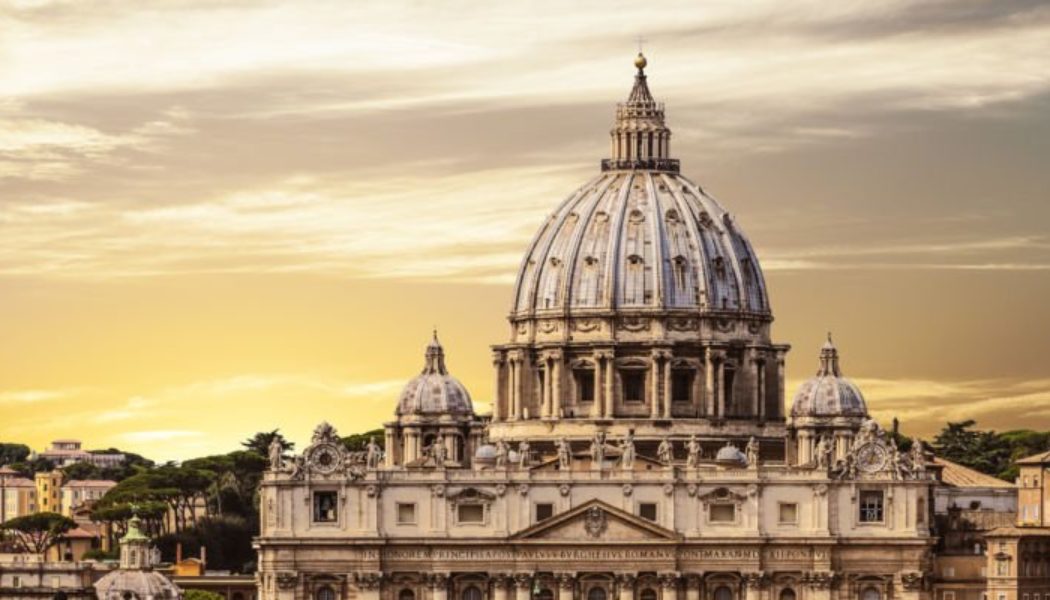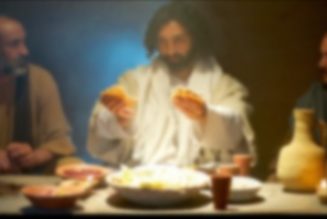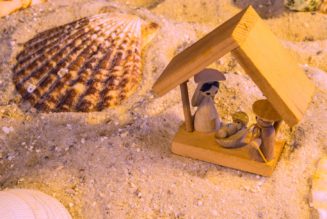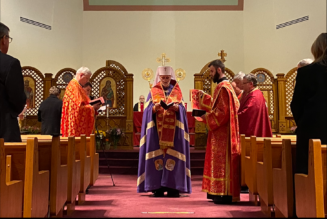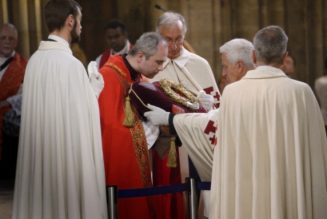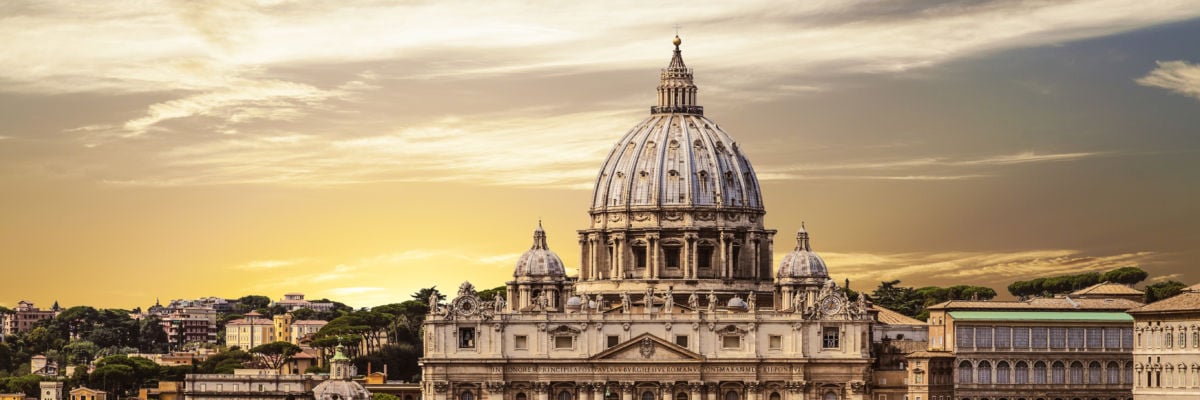
But what if we could show our Protestant brothers and sisters that Catholicism is the truest and most complete form of biblical Christianity? If we could do that, who knows what good would come of it. Then, perhaps, the world would be less scandalized by Christian disunity and bickering; perhaps Christians could be more united on the moral and ethical fronts of society; perhaps more lives and souls would be saved; perhaps God’s will would be done.
I am certain that if Protestants saw the Catholic Church as it really is, most would enter it at any cost; not as a “change of denomination” but as a perfection—a completion—of the faith they’ve held as a non-Catholic Christian.
If the Catholic Church really is “the household of God, built upon the foundation of the apostles and prophets” (Eph. 2:20) and the “pillar and bulwark of the truth” (Tim. 3:15), what Christian would not want to be in it? Indeed, if Christ really did establish a church on earth as the Scriptures clearly reveal—one that “the powers of death shall not prevail against”—then where is it? This is the question that every Christian must ask; and if he seriously desires to be in it, he must not stop asking, “Where is it?” until he is certain he has found it.
Catholicism is true
G.K. Chesterton, a convert to Catholicism, remarked that a convert’s first step toward conversion is when he decides to be fair to the Catholic Church:
It is impossible to be just to the Catholic Church. The moment a man ceases to pull against it he feels a tug towards it. The moment he ceases to shout it down he begins to listen to it with pleasure. The moment he tries to be fair to it he begins to be fond of it (from Catholic Church and Conversion).
Catholicism makes sense; it is beautiful and wise. And everybody loves beauty and wisdom. Thus everybody loves the Church, once it is seen for what it truly is.
How, then, can we draw our Protestant friends into relationship with “the whole Christ” (see Catechism of the Catholic Church 795)? How can we show them Catholicism is true? There are many ways, some of which are not intellectual in nature. But here is a way I believe has proven itself to have great power and potential for conviction:
What exactly is it that every Protestant can’t not know? That the earliest Christian Church was Catholic through and through.
The fact is, most Protestants simply don’t know these things. I dare assume most barely think (if they think at all) about the historical details of the sixteenth-century Reformation, not to mention the historical details of the, say, second-century Church. The early Church is off most Protestants’ radar. But it shouldn’t be.
For many converts from Protestantism, discovering the writings of the Church Fathers has been the straw that breaks the camel’s back. Sucking fuel from the wavering Protestant’s fire—in addition to the discovery of those “elusive” biblical texts that support Catholic doctrine—are often the early Church writings as they emerge from obscurity. And there are a lot of them.
Marcus Grodi, a former Evangelical pastor, is founder and president of the Coming Home Network International, an organization that helps new converts (especially former non-Catholic clergy) make the transition. He writes:
Certainly an amazing majority of converts mention how reading the early Church Fathers, either for the first time or for the first time with awareness, convinced them that the early Church was amazingly Catholic and certainly not Protestant! (“The Early Church Fathers I Never Saw,” online at chnetwork.org).
But where is the evidence? Are there good sources that show the early Church was Catholic—and Catholic in the sense that we mean today? Let’s take a look.
“Catholic” from the earliest days
Catholic can be said to mean “according to the whole” or “universal.” That’s what it has always meant in a Christian context. There is one Church founded by Christ, and everyone is invited to be part of it. It is the one, universal Church.
The earliest recorded use of this term is found the early second century from St. Ignatius of Antioch: “Wherever the bishop shall appear, there let the multitude of the people also be; even as wherever Jesus Christ is, there is the Catholic Church” (Letter to the Smyrnaeans, 8).
Ignatius does not explain what Catholic means here. He just uses it without qualification, suggesting that it was already a familiar term in the wider Church community.
And what about the ranks in the Church conferred by the sacrament of holy orders: bishop, priest and deacon? It’s clear that these designations existed from the time of St. Paul’s epistles (see especially 1 Timothy, 2 Timothy, Titus, and Acts). But what about the early Church writings?
Consider this from St. Ignatius in A.D. 110:
Take care to do all things in harmony with God, with the bishop presiding in the place of God, and with the presbyters [priests] in the place of the council of the apostles, and with the deacons, who are most dear to me, entrusted with the business of Jesus Christ (Letter to the Magnesians 6.1).
There was a succession of the apostles, and this succession—called apostolic succession—continues to the present day. Every bishop in the Catholic Church has been ordained in a direct line from the original twelve apostles of Christ (see Acts 1:20) .
St. Clement of Rome, one of the Church’s first popes and a disciple of Peter, writes around A.D. 80:
Our apostles knew through our Lord Jesus Christ that there would be strife for the office of bishop. For this reason, therefore, having received perfect foreknowledge, they appointed those who have already been mentioned and afterwards added the further provision that, if they should die, other approved men should succeed to their ministry (Letter to the Corinthians 42:4-5, 44:1-3 [A.D. 80], emphasis added).
An early record of the line of successive popes (and bishops of Rome), beginning with St. Peter, is provided by St. Irenaeus at the tail end of the second century (see Against Heresies 3.3.3). From the beginning, it was understood that the bishop of Rome was the “chief” bishop, the one who held “the keys to the kingdom of heaven” (see Matthew 16:18-20).
Here is a later excerpt from the early Church (there are earlier examples that confirm the bishop of Rome’s primacy within the college of bishops). St. Cyprian of Carthage writes in A.D. 251:
Indeed, the others were also what Peter was [apostles], but a primacy is given to Peter, whereby it is made clear that there is but one Church and one chair. . . . If someone does not hold fast to this unity of Peter, can he imagine that he still holds the faith? If he [should] desert the chair of Peter upon whom the Church was built, can he still be confident that he is in the Church? (The Unity of the Catholic Church 4, emphasis added).
Now, when you read the New Testament, here’s what you’ll find regarding St. Peter:
1. Every time the apostles are listed, Peter is the first to be mentioned (see Matthew 10:2, Luke 6:13-16, Acts 1:3).
2. Peter is called the chief apostle (see Matthew 10:2).
3. Peter is listed before James and John whenever Jesus’ inner circle of three is listed (See Matthew 17:1; Mark 5:37, 9:2, 14:33; Luke 8:51, 9:28).
4. On several occasions Peter is the only name mentioned when referring to the group of disciples. St. Paul does this (see 1 Corinthinans 9:5, 15:5). St. Luke does this (see Acts 2:37), as does St. Mark (Mark 16:7).
5. Peter’s name (in the forms of Peter, Kepha, and Cephas) is mentioned in the New Testament more than all of the other apostles’ names put together.
This is why the Church has remained so rock-solid through the ages. That the people of God would heed his prayer that “they may be one,” Jesus, in his infinite wisdom, built his house upon the rock (see Matthew 7:25; 16:18). Peter (from Petros, meaning rock) was given the strength to uphold the integrity of the Church (see Luke 22:32).
The apostles and their successors are established guardians of the deposit of faith—fallible men with a special gift from God to help them do the job (see 1 Timothy 4:14, 2 Timothy 1:6)—led by a chief guardian who represents God as his prime minister until he returns once and for all (see Isaiah 22).
God’s word, which the bishops protect, has been handed down both in written and oral forms to the Church (see 1 Thessalonians 2:15, 1 Peter 1:25). The Bible was never considered the sole authority in the early Church. The Bible (see 1 Timothy 3:16), along with Tradition (see 1 Thessalonians 2:13, 2 Thessalonians 2:15, 1 Corinthians 11:2) and the teaching authority of the Church (see Matthew 16:18, 18:18) served as a tripod—as they do today—holding the Church steady in faith and morals.
The early sacraments
Now what about the Mass, sacraments, and in particular, the Eucharist? Can these key components of the Catholic Faith also be found in the writings of the early Christians?
Catholics believe we are saved by grace (see Ephesians 2:8) through faith (see Romans 3:26) working in love (see Galatians 5:6, 1 Corinthians 13) and believe, along with the unanimous testimony of the Church Fathers, that the sacrament of baptism is the way that initial regeneration by “saving grace” comes to the Christian. This is why babies aren’t excluded. Salvation is free, though bought at a price.
From baptism onward, “salvation is worked out in fear and trembling” (Phil. 2:12) and “he who endures to the end will be saved” (Matt. 10:22).
Our first pope affirms “Baptism . . . now saves you” (1 Pet. 3:21). This was the belief from the beginning: that baptism cleanses the baptized of all sin—a free gift of sanctifying grace by means of water—and as a result the baptized are born again into new life (see John 3:5).
Tertullian writes, “Happy is our sacrament of water, in that, by washing away the sins of our early blindness, we are set free and admitted into eternal life” (Baptism 1 [A.D. 203]).
But Christians are likely to commit wrongdoings again due to the wounds of previous sin. Jesus said to the apostles, “Whose sins you forgive are forgiven them” (John 20:21-23) so that we might experience forgiveness “in the presence of Christ” through the priests and bishops (see 2 Corinthians 2:10). This is why we have the sacrament of confession.
St. Basil the Great writes:
It is necessary to confess our sins to those to whom the dispensation of God’s mysteries is entrusted. Those doing penance of old are found to have done it before the saints. It is written in the Gospel that they confessed their sins to John the Baptist [Matt. 3:6], but in Acts [19:18] they confessed to the apostles (Rules Briefly Treated, 288 [A.D. 374])
The Eucharist—which comes to us in the Holy Mass when bread and wine are mysteriously changed in substance but not in physical appearance to Christ’s body and blood at the blessing of the priest—was at the center of Christian worship even in the earliest stages of Christianity.
Why? Because the Eucharist is Christ (see 1 Corinthians 10:16–17, 11:23-29; John 6:32-71; and all the Last Supper accounts).
St Ignatius of Antioch, who was a disciple of John the apostle, writes at the turn of the second century:
Take note of those who hold heterodox opinions on the grace of Jesus Christ which has come to us, and see how contrary their opinions are to the mind of God. . . . They abstain from the Eucharist and from prayer because they do not confess that the Eucharist is the flesh of our Savior Jesus Christ. . . . They who deny the gift of God are perishing in their disputes (Letter to the Smyrnaeans 6:2-7:1 [A.D. 110]).
St. Justin Martyr wrote:
We call this food Eucharist. . . . For not as common bread nor common drink do we receive these; but since Jesus Christ our Savior was made incarnate by the word of God and had both flesh and blood for our salvation, so too, as we have been taught, the food which has been made into the Eucharist by the eucharistic prayer set down by him, and by the change of which our blood and flesh is nurtured, is both the flesh and the blood of that incarnated Jesus (First Apology 66 [A.D. 151]).
Final thoughts
This article barely touches the available writings of the early Church. I’ve only provided a small sample of excerpts, but I recommend that you go and read the writings for yourself. Many of them aren’t long (although another many of them are!). If you and I hope to help our Protestant brothers and sisters see the Catholic Church as it really is, the testimony of the early Church will be indispensable in helping them arrive at that affirmation.
The goal is to lead our separated brethren to “the whole Christ,” who resides ultimately in the eucharistic Church (see Catechism of the Catholic Church 795).
Indeed, one of the greatest affirmations I’ve experienced personally in my decision to be Catholic (in addition to discovering the rich biblical basis for Catholic beliefs) has been my discovery of the writings of the early Church. “To be deep in history is to cease to be Protestant,” wrote the great convert from Anglicanism, Blessed John Henry Newman.
I believe what the Catholic Church teaches because I have every reason to believe the Catholic Church of today is the same Church founded by Christ in the first century. Along with St. Augustine and the rest of the early church Fathers: “We believe also in the holy Church, that is, the Catholic Church” (Faith and the Creed 10:21 [A.D. 393]).
Join Our Telegram Group : Salvation & Prosperity
